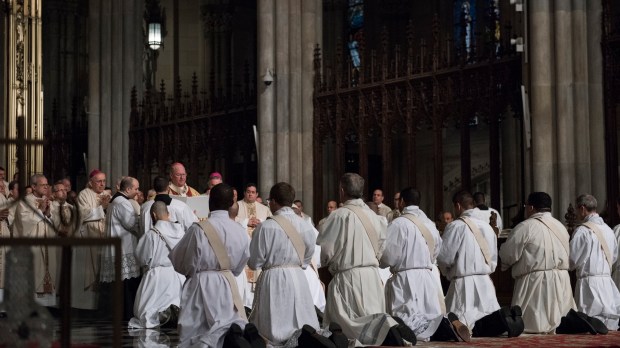It should be noted: the Church is already ordaining married men, both as priests and deacons.
But the question needs to be asked: should the Church ordain more of them, and make this practice more widespread? The need is great and will only grow in the next few decades, as more priests retire or enter eternal life.
Austin Iverleigh has some thoughts in Crux:
In much the way that access to the sacraments of the civilly divorced and remarried was the neuralgic question in the family synod – the issue around which disagreements coalesced – in a future synod on the ministries it will be the priestless parish. And just as there was a longstanding, controversial proposal in response to the divorced and remarried issue – Cardinal Walter Kasper’s invitation to consider the Orthodox approach – there is one for priestless parishes. A solution has been kicked around the yard for many years by Fritz Lobinger, a retired German bishop who lives in Durban, South Africa. During 50 years in South Africa, and traveling to many parts of the world, he observed how many Christian communities in remote areas are led in practice by small groups of committed, mature lay people. His solution is to ordain them after a brief training, so that they can administer the sacraments within that community alone. These “locally ordained ministers” – Lobinger says it is important not to call them priests, even though it would involve precisely the same sacrament of priestly ordination – would be, in effect, a parallel priesthood, complementary to the existing norm in the Latin rite of a celibate, seminary-trained priest sent by his bishop to different parishes or missions. Lobinger points to a precedent in Acts of the Apostles 14:23 when St Paul and Barnabas appointed – or ordained – “elders” in the young Christian communities, the term referring not so much to the age of the people but their maturity or fitness for the task. These were teams of men who were not sent to their community but came out of it; who ministered to the community part-time, while continuing to work at their professions; and who had families. This shows, says Lobinger in a book published recently in Spanish, that the Church for a number of centuries ordained local leaders chosen by the local community, who had proven their worthiness over some time. Francis has given many signals of his willingness to open up the question of ordaining married men, even encouraging local Churches to put forward proposals.
Read it all. There’s much more background and analysis.

